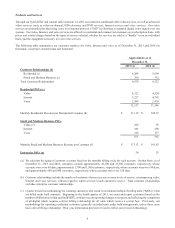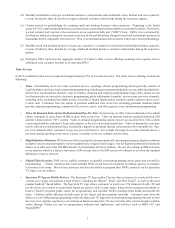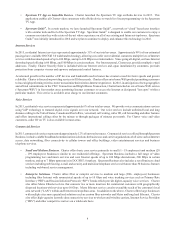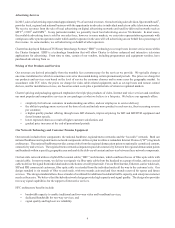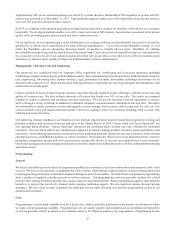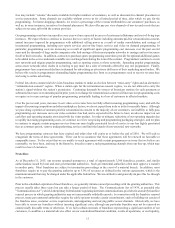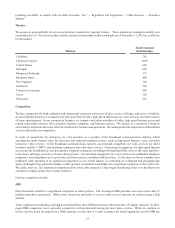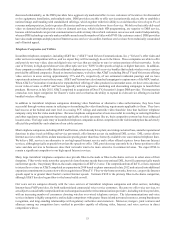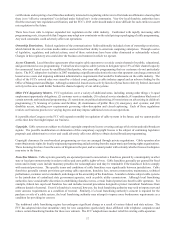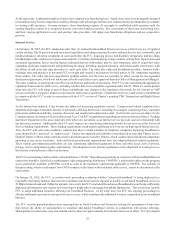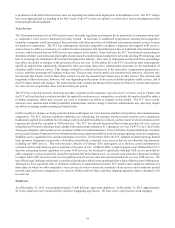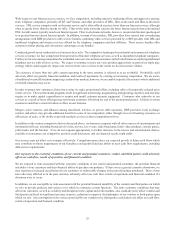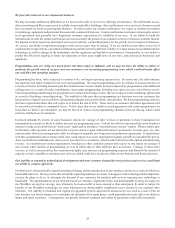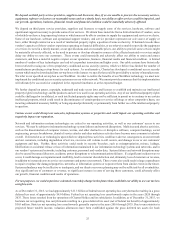Charter 2015 Annual Report Download - page 30
Download and view the complete annual report
Please find page 30 of the 2015 Charter annual report below. You can navigate through the pages in the report by either clicking on the pages listed below, or by using the keyword search tool below to find specific information within the annual report.15
wireless carriers, including T-Mobile and Verizon, are exempting certain video traffic from data charges thus encouraging video
over the Internet.
Seasonality and Cyclicality
Our business is subject to seasonal and cyclical variations. Our results are impacted by the seasonal nature of customers receiving
our cable services in college and vacation markets. Our revenue is subject to cyclical advertising patterns and changes in viewership
levels. Our U.S. advertising revenue is generally higher in the second and fourth calendar quarters of each year, due in part to
increases in consumer advertising in the spring and in the period leading up to and including the holiday season. U.S. advertising
revenue is also cyclical, benefiting in even-numbered years from advertising related to candidates running for political office and
issue-oriented advertising.
Regulation and Legislation
The following summary addresses the key regulatory and legislative developments affecting the cable industry and our three
primary services for both residential and commercial customers: video service, Internet service, and voice service. Cable system
operations are extensively regulated by the federal government (primarily the FCC), certain state governments, and many local
governments. A failure to comply with these regulations could subject us to substantial penalties. Our business can be dramatically
impacted by changes to the existing regulatory framework, whether triggered by legislative, administrative, or judicial rulings.
Congress and the FCC have frequently revisited the subject of communications regulation and they are likely to do so again in
the future. We could be materially disadvantaged in the future if we are subject to new regulations or regulatory actions that do
not equally impact our key competitors. We cannot provide assurance that the already extensive regulation of our business will
not be expanded in the future.
Video Service
Must Carry/Retransmission Consent. There are two alternative legal methods for carriage of local broadcast television stations
on cable systems. Federal “must carry” regulations require cable systems to carry local broadcast television stations upon the
request of the local broadcaster. Alternatively, federal law includes “retransmission consent” regulations, by which popular
commercial television stations can prohibit cable carriage unless the cable operator first negotiates for “retransmission consent,”
which may be conditioned on significant payments or other concessions. Congress passed legislation in 2014 imposing certain
restrictions on broadcasters’ exercise of retransmission consent authority and directing the FCC to review aspects of its existing
retransmission consent rules. That FCC review is on-going. Popular stations invoking “retransmission consent” have been
demanding substantial compensation increases in their recent negotiations with cable operators, thereby significantly increasing
our operating costs.
Additional government-mandated broadcast carriage obligations could disrupt existing programming commitments, interfere with
our preferred use of limited channel capacity, and limit our ability to offer services that appeal to our customers and generate
revenues.
Cable Equipment. In 1996, Congress enacted a statute requiring the FCC to adopt regulations designed to assure the development
of an independent retail market for “navigation devices,” such as cable set-top boxes. As a result, the FCC required cable operators
to make a separate offering of security modules (i.e., a “CableCARD”) that can be used with retail navigation devices. Some of
the FCC’s rules requiring support for CableCARDs were vacated by the United States Court of Appeals for the District of Columbia
in 2013. The FCC had also adopted an “integration ban,” which had required cable operators to use CableCARDs in all of their
new set-top boxes. In 2013, Charter received a two-year waiver from the FCC’s “integration ban,” on the condition that Charter
meet certain milestones regarding downloadable security by the end of the waiver period. In December 2014, as part of the
Satellite Television Extension and Localism Act Reauthorization Act of 2014 (“STELAR”), Congress repealed the integration
ban, effective December 4, 2015. STELAR also directed the FCC to establish a “working group of technical experts” to identify
and report on downloadable security design options that are not unduly burdensome and that promote competition with respect
to the availability of navigation devices. That group issued its report in August 2015, and comments on the report were subsequently
filed at the FCC. The expert report identified alternative proposals, but no consensus recommendation, for FCC action. On
January 27, 2016, the FCC Chairman announced that he had circulated a Notice of Proposed Rulemaking to the other FCC
commissioners for vote on February 18, 2016 and outlined his proposal regarding navigation devices. If adopted, the Chairman’s
proposal would require us to allow navigation devices on our network if the navigation devices meet standards to be developed
by a third party standard setting body envisioned by the proposed rules regardless of the manufacturer of the device. It remains
uncertain what rules, if any, will ultimately be adopted and what operating or financial impact any such rules might have on us
including on the security of the content we obtain from programmers that is delivered over any third party navigation device,
customer privacy and the user experience.



